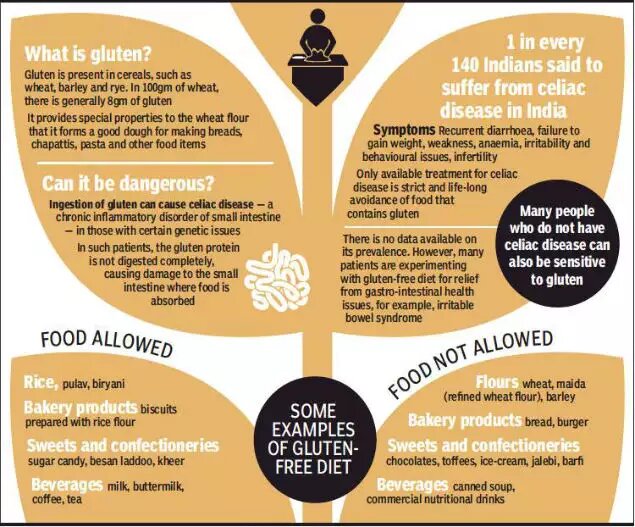Celiac Disease | 26 Jun 2019
It has been revealed that one of every 140 persons in India is estimated to have celiac disease.
- Also called Wheat Allergy, celiac disease is a chronic inflammation of the small intestine caused by an intolerance to gluten and usually present in genetically predisposed individuals.
- Gluten is a general name for the proteins found in wheat, rye, barley and triticale – a cross between wheat and rye.
- Gluten helps food maintain its shape, acting as the glue that holds food together.
- Effect of the disease on the body: When people with celiac disease eat gluten, their body mounts an immune response that attacks the small intestine, indicating the disease being an autoimmune disease.
- These attacks lead to damage on the villi, small fingerlike projections that line the small intestine, that promote nutrient absorption.
- When the villi get damaged, nutrients cannot be absorbed properly into the body.
- Also, the modern wheat which is hexaploid rather than diploid, is more antigenic, meaning it stimulates the production of antibodies when introduced into the body.
- People with celiac disease have a two times greater risk of developing coronary artery disease, and a four times greater risk of developing small bowel cancers.
- Currently, the only treatment for celiac disease is lifelong adherence to a strict gluten-free diet. People living gluten-free must avoid foods with wheat, rye and barley, such as bread and beer.
- Many people who do not have celiac disease can also be sensitive to gluten, known as non celiac gluten sensitivity.
Issues with Gluten Free Diet
- People not diagnosed with celiac disease are giving up cereal grains for perceived benefits such as weight loss and better digestion.
- Cereal grains such as wheat are a source of dietary fibre and is needed for the bowels to work properly.
- Food containing gluten also are an important source of protein that most Indians lack.
- Going gluten-free might also increase the risk of heart disease.
Autoimmune Disease
- A body has an immune system, which is a complex network of special cells and organs that defends the body from germs and other foreign invaders.
- In a body suffering from Autoimmune disease, the immune system attacks the body's own tissues and organs.
- The body parts that are affected depend on the type of autoimmune disease. There are more than 80 known types. Some of them are Multiple Sclerosis, Leucoderma etc.

